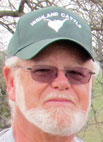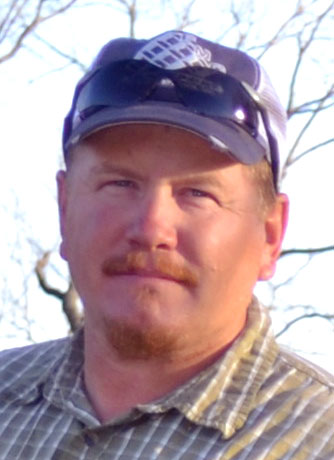
A small herd of Highlander cattle grazing on a farm in the midst of the rolling Ozark hills can, for a moment, transport you to the Scottish Highlands. These small gentle beasts known for their ability to adapt and survive in rugged terrain have found a place in the heart of Jerry Delcour, wife, Janet, and daughter, Jerica, in Hurley, Mo.
Jerry gained interest in the Scottish Highland cattle after first seeing some at Farmfest more than 10 years ago. He was impressed with how calm the cattle were, even with little Jerica petting and sitting next to them. Another attribute was their cattle’s small build, which helped Jerry make the decision to choose Scottish Highlands. “We mainly got into it because of their size, and the number you can have on a piece of land compared to larger cattle breeds.”
Scottish Highland cattle are used to dealing with cold temperatures and weather conditions that other cattle couldn’t bear. “I use a lot less hay,” Jerry said about winter-feeding, “Cold weather is normal to them, they don’t have to keep eating to stay warm like other cattle.” When it comes to calving, Jerry has had no problems in the years that he has raised them and regards his cows as excellent mothers that are very protective. He said, “They are wooly little fella’s when they’re born and get up quickly,” making calving ease high on the list of positive traits for this type of cattle. The momma cows have compact udders that produce milk very high in fat.
Jerry, Janet and Jerica belong to the Heartland Highland Association. It consists of 180 farms in over six states. The group has an annual meeting every year in Branson and is preparing to host the first Scottish Highland auction at the Norwood Sale Barn on Thursday, April 19. The Scottish Highland is a beef breed, and Jerry has successfully marketed the meat through a website which Janet manages.
The meat is very lean, all grass-fed with no antibiotics. “There are very few diseases with this breed, and they never get pinkeye,” Jerry said of their healthy nature. A local health food store keeps the ground beef in stock, and the packaged meat or a side of beef can be bought directly from the farm, as it is available. “The meat has a good beef flavor.” Jerry explained, “When we grind the entire animal, it makes about a 90 percent lean burger.”
Jerry has also sold registered breeding stock. All of the cattle that he sells are trained for management ease, “Jerica helps with the halter breaking,” he said of his daughter who obviously enjoys working with cattle.
Jerry does caution that the cattle must have access to good shade during hot summer months. “They stay in the shade until dusk, then come out to graze at night.” Their heavy coats that serve them well during winter months keep them very inactive during the heat. Jerry does not work the cattle during summer months and provides them with ponds and shade. He also explained that this is a reason they do not fare well in regular sale barn situations. “Highlands can’t be kept in a feedlot with other cattle.”
They have had as many as 18 to 35 head of cattle on their 35-acre farm. Jerry likes to keep his herd size at 12 to 15 cows and a bull. If he had more acreage he would be interested in crossbreeding the Highland cattle with an Angus or other mainstream beef breed. A crossbreed would produce a more versatile offspring that could be sold at a sale barn while taking advantage of the low maintenance Highland cows that raise good calves.
Jerry’s cattle can be found throughout the Ozarks. The Dickerson Park Zoo in Springfield, Mo., has one of Jerry’s cows in their petting zoo. Another one of their heifers can also be seen in the “Noah” show featured at the Sight and Sound Theatre in Branson, Mo. Jerry is excited about the growing popularity of this very old breed that he thinks is due to the growth of small family farms.







